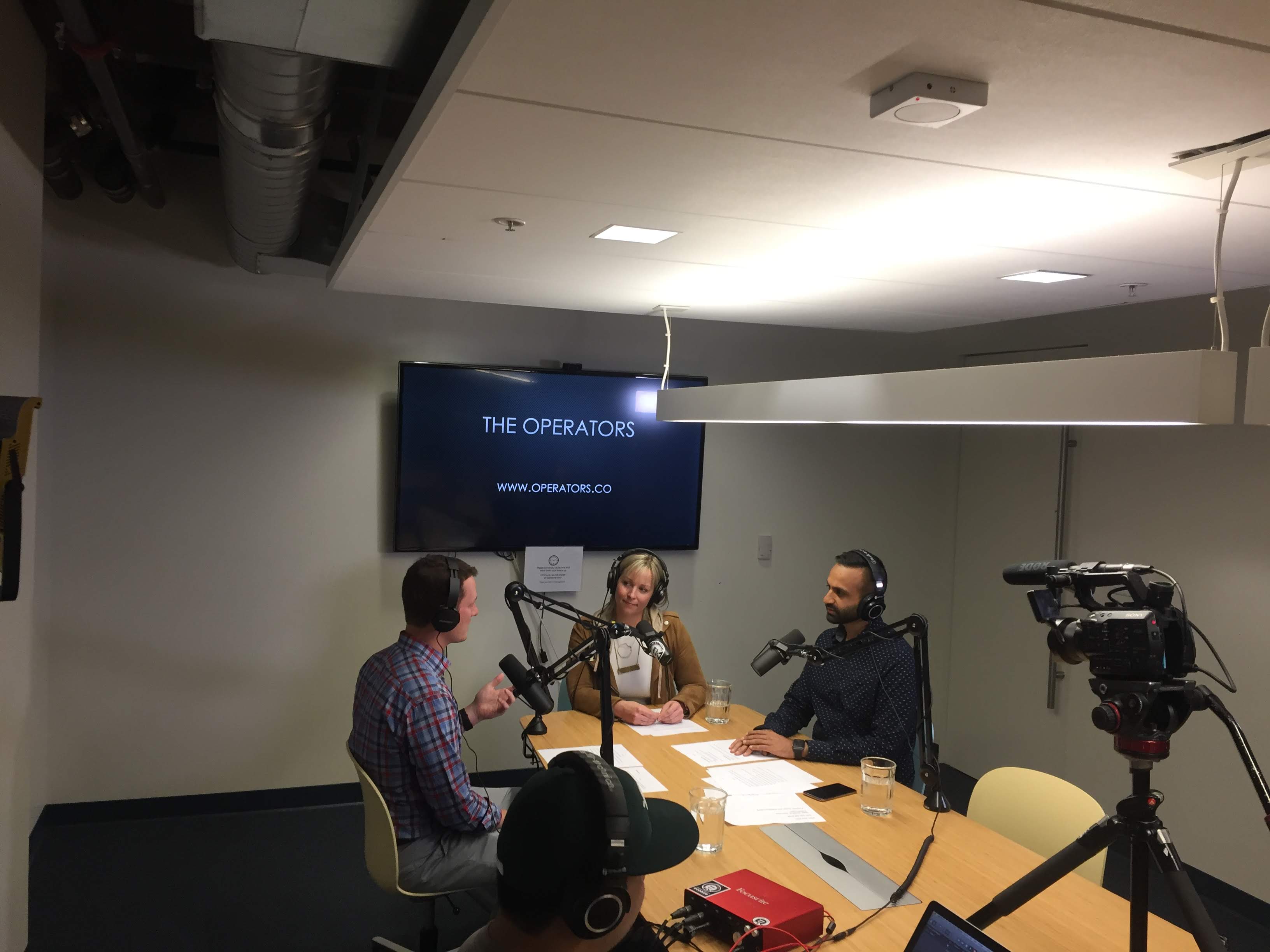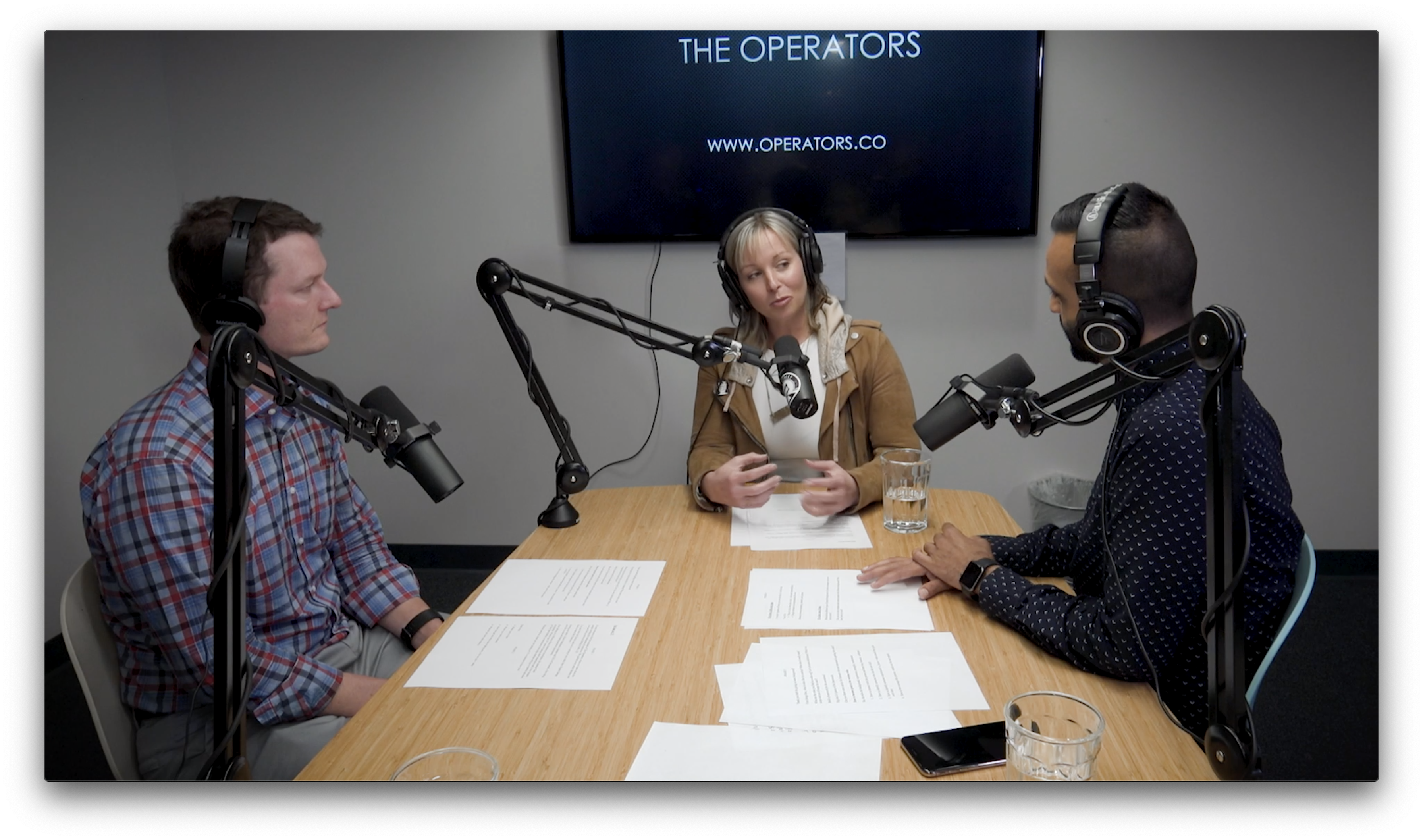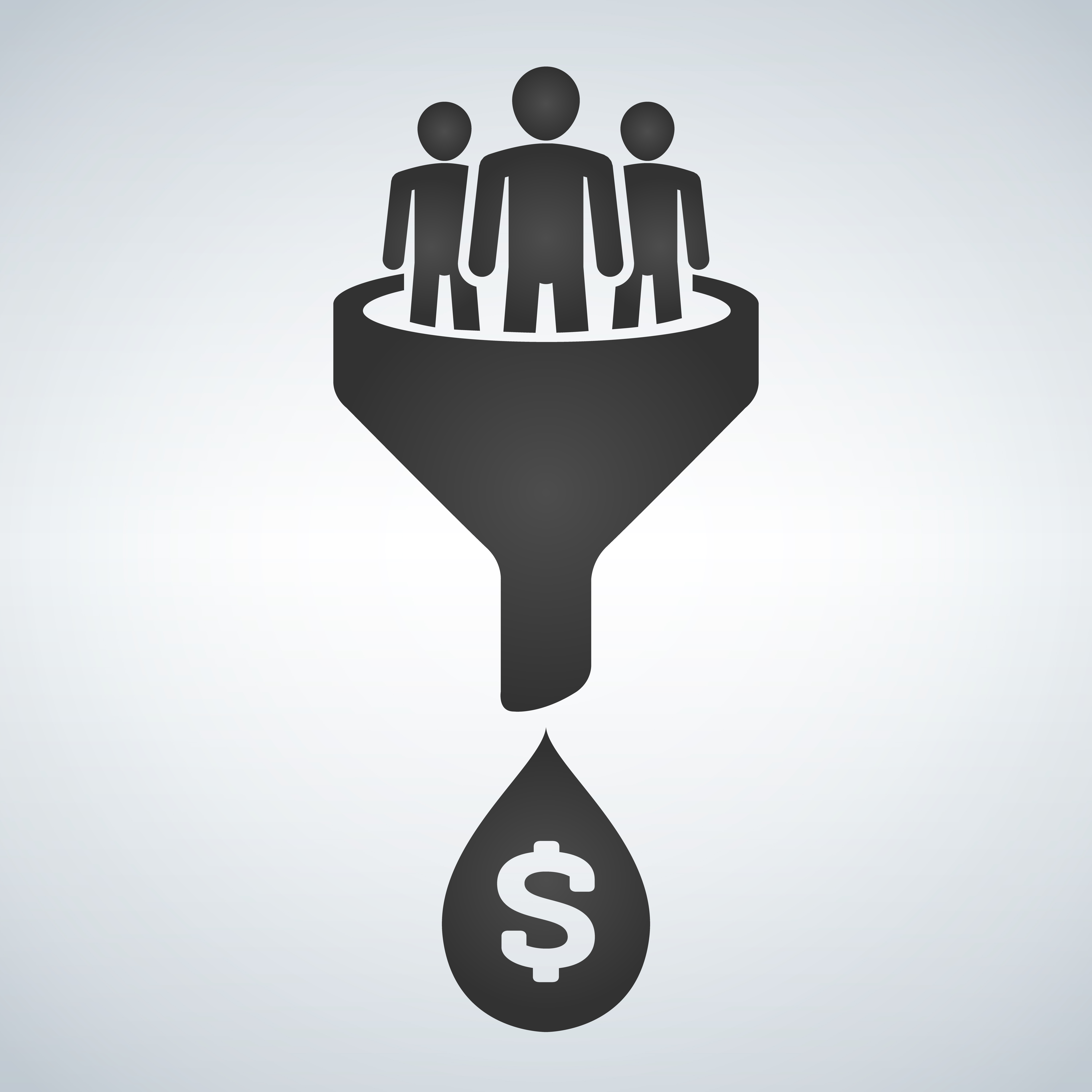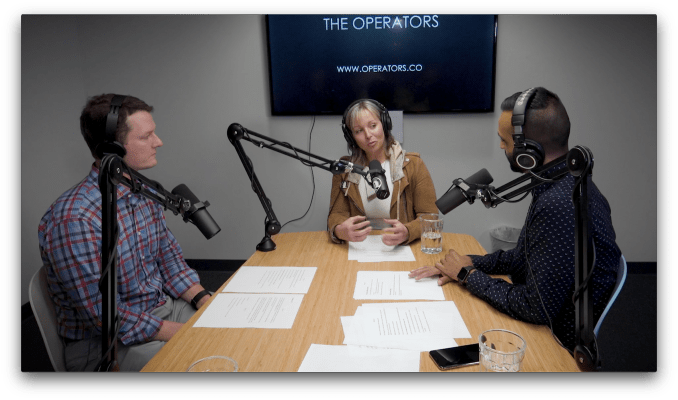Welcome to this transcribed edition of The Operators. TechCrunch is beginning to publish podcasts from industry experts, with transcriptions available for Extra Crunch members so you can read the conversation wherever you are.
The Operators highlights the experts building the products and companies that drive the tech industry. Speaking from experience at companies like Google, Brex, Slack, Docsend, Facebook, Edmodo, WeWork, Mint, etc., these experts share insider tips on how to break into fields like product management and enterprise sales. They also share best practices for entrepreneurs to hire and manage experts in fields outside their own.
This week’s edition features Whitney Sales, a general partner at Acceleprise, the leading enterprise SaaS accelerator, and Russ Heddleston, founder and CEO of DocSend, a fast-rising document management and sharing product.
Whitney brings sales experience from LoopNet, Meltwater, SpringAhead/Tallie, and People Data Labs, before starting her own sales consultancy aptly named “The Sales Method.” Russ brings experience from founding and selling his first company to Facebook, before becoming the first salesperson of the second company he founded, DocSend.

Neil Devani and Tim Hsia created The Operators after seeing and hearing too many heady, philosophical podcasts about the future of the world and the tech industry, and not enough attention on the practical day-to-day work that makes it all happen.
Tim is a Venture Partner at Digital Garage and the CEO & Founder of Media Mobilize, a media company and ad network. Neil is an early-stage investor based in San Francisco with a focus on companies that solve serious problems, including Andela, Clearbit, Recursion Pharmaceuticals, Vicarious Surgical, and Kudi.
If you’ve ever had to convince anyone of anything, or are interested in a career in sales or starting a company where you will have to hire or manage salespeople, you can’t miss this episode.
The show:
The Operators, hosted by Neil Devani and Tim Hsia, highlights the experts building the products and companies that drive the tech industry. Speaking from experience at companies like Google, Brex, Slack, Docsend, Facebook, Edmodo, WeWork, Mint, etc., these experts share insider tips on how to break into fields like product management and enterprise sales. They also share best practices for entrepreneurs to hire and manage experts in fields outside their own.
In this episode:
In Episode 1, we’re talking about sales. Neil interviews Whitney Sales, an investor with Acceleprise, the leading enterprise SaaS accelerator, and Russ Heddleston, founder and CEO of Docsend.
Neil Devani: Hi and welcome to the first episode of The Operators when we talk to the people building the companies of today and tomorrow. We publish every other Monday and you can find us online at operators.co.
Today’s episode is sponsored by Four Sigmatic. Four Sigmatic’s Lion’s Mane Mushroom Coffee has all of coffee’s focusing bark with none of the jittery bite. Lion’s Mane provides productivity, focus, and creativity all while being a healthy alternative to that daily cup of coffee. Go to www.foursigmatic.com/operators-special to try out Four Sigmatic.
I’m your host Neil Devani, and we’re coming to you today from Digital Garage here in sunny San Francisco. Joining me is Russ Heddleston, founder and CEO of DocSend, a popular product for managing and sharing sensitive documents.
Also joining us is Whitney Sales, partner at Acceleprise, the premier SaaS accelerator. Whitney has 10 years of startup sales experience and is the founder of the sales method, a consultancy that helps startups with go-to-market and sales. Whitney and Russ, thank you for joining us. It’s a pleasure to have you. If we could start if just give us a little bit of your background that would be great.
Russ Heddleston: I’ll start. I’m Russ Heddleston, as you said, co-founder and CEO of DocSend. My background is not in sales it’s in software engineering. I was at Stanford for my Bachelor’s and Masters in computer science. And then I worked at a bunch of different tech companies over the years as an intern at Microsoft, as a PM intern, I was the first engineering intern at Trulia, I ran the engineering team in a company called Greystripe for a few years, an early intern at Dropbox.
And then DocSend is actually my second company. I started the first one in 2010 while I was in business school at Harvard, and then ended up being acquired by Facebook. And I started DocSend about six years ago here in San Francisco.
Whitney Sales: Hi, my name is Whitney Sales. I’m a GP, general partner at Acceleprise Ventures. My background is an early stage sales. Before Acceleprise I actually started a sales consultancy called The Sales Method where I worked with founders in getting to $1M in ARR, really in the early stages of the problem solving of sales.
Before that I worked for several startups. LoopNet in the early days, helped launch two products for them. I worked at a company called Meltwater before they were acquired.
And I worked for a company called SpringAhead. They are now Tallie, they were also acquired. Ran sales for a company called People Data Labs. And then I just spun out on my own and started the Sales Method which ended up bringing me to Acceleprise.

Devani: Awesome, really great story. Just to start, I would love to hear from both of you a little bit about your organizations and how you think about sales. And maybe you can give us a little bit of the definitions around different roles that you see in a sales organization, whether it’s your company or other companies you’re investing in or have worked with in the past.
Sales: There’s a lot of different roles in sales. It really depends on the type of organization you’re running, candidly. But traditionally there’s an SDR, sales development rep. I usually recommend that being the first hire in a sales team for a founder, so they can scale up their own time.
Then there’s an account executive within an organization that’s typically doing a direct sale. There may be senior account executives or junior account executives, like a mid-market enterprise executive depending on the type of sales cycle they’re running.
Sales engineers, if you’re dealing with a complex dev tool, traditionally, or a more heavy enterprise implementation tool.
And then if you look at customer support and customer success, those kind of roles and being part of sales.
SDRs traditionally fall under demand generation. It can fit under sales, and it can fit under marketing too. So it’s a little bit of a debate in the ecosystem on where they sit but that’s generally how I see the teams breaking down from a team perspective.
Devanie (to Heddleston): Do you structure yourselves at DocSend that way? Do you have these different roles like that?
Heddleston: Yeah, we definitely break it out. I also think even more fundamental than how you structure your sales team is what is your business go-to-market model. And so the way you do early sales is very different if you’re saying, “We’re targeting 500k a year of contracts. And we’re doing top-down from the senior organization” versus something that’s more land and expand or even freemium, or a lower cost model of acquisition.
And different products and different value propositions lend themselves to each of them. For DocSend we’ve got about 9,000 companies that are paying for it. And what’s worked really well for us has been, the product spreads itself pretty well across a few different price points. We’ll get into a company, and then in the sales team, we have these two different functions, SDR and AE.
SDRs are booking meetings when people are interested. They’re also looking at the data, seeing when a certain team is expanding, there are a number of seats on DocSend. They’ll reach out, add value, make sure they know how it works, and they’ll set up a call for an AE to try to get them upsold or making sure they’re getting the most out of it.
Or you can just introduce them directly to the customer success team we have that’s all post sales. Or they’re just going to help out with accounts that end up paying enough money for DocSend that we need someone in there to help manage that.
And we also have a VP of sales. He’ll get more involved when a large enterprise comes inbound with interest and says I want a demo. Then he’s very helpful for running that because it looks very, very different. One if it’s inbound versus outbound, and two if it’s a big enterprise versus a smaller company.

Devani: When you think about the folks that you hired or worked with, what kind of backgrounds do you see? What makes someone good at sales?
Sales: It plays a lot to what we were talking about, depending on the sales model. You broke down different types. I look at three traditional sales models such as the enterprise models which are heavy enterprise customers, longer sales cycles. There’s the mid-market model which is more traditionally an inside sales model.
And then there’s the premium land and expand and SMB. This is a more consumer-type model. The type of person for those roles really vary quite a bit.
For your freemium models and lower price points it’s more a transactional salesperson. You’re looking for people who are typically more junior, faster sales cycles, who want to get quick wins a lot, typically less sales experience.
Your mid-market inside salespeople traditionally have some sales experience, maybe have moved from an SDR role before. And then you have your enterprise people, they typically done sales for a while or have a network that they’re bringing to the table, more relationship oriented because they’re having to work for these customers for a long period of time. And ideally starting an enterprise deal and expanding across the organization… starting with the fin and then going after the entire whale. The DNA really matters but then it’s also the type of organization you are.
Heddleston: That’s actually a really good baseline to cover it because it does depend on a lot of factors, as well as just the amount of experience you have.
And certain people can actually move up faster through the ranks. Some people kind of get stuck at SDR or AE. And so the skillset that’s changed between them, some people will specialize in one. Other people are really like moving between over time and can actually then be pretty flexible sales leaders because the team that you manage as a sales leader is also really different. It kind of depends on your background there.
There are also some other interesting areas like media sales, and a lot of our customers are in media sales. And that’s actually just an entirely separate thing than SaaS sales.
When we look at salespeople, if they have media sales experience we’re usually like, it’s a little different, or sales of services are also very different.
And so when we think about sales we’re usually talking about SaaS sales. But there’s just so many other different types of sales. Insurance sales is huge.
I always try to think about it in the most general sense for sales. But thinking specifically about SaaS I do think that you can start out as an SDR and it’s just really how fast can you learn. Because I think most organizations are willing to promote people as they develop the skills. And it is increasingly hard to find people who are at that mid-market level, which becomes much more about an account-based sale. If you just do the best practices from an SMB/AE perspective or mid-market deals you will definitely fail.
There are certain concepts that you need to be introduced to and then get really good at. And it really is a craft. It takes a long time. And it’s a pretty big knowledge base that you have to adopt to be really good at the job.
Sales: Another point to mention as well is the stage of the company’s evolution actually plays a lot in the DNA of the salesperson you’re hiring. Your initial hires that you’re going to bring on to the team are traditionally people who are more generalist, so they can take on a little bit of support, maybe a little bit of the SDR function. They might be handling the entire sales cycle.
But as the company evolves, the specialization of these people from an SDR, and AE, and enterprise capacity really evolves with the organization. You really have to look at that in the DNA when you’re hiring people, or at the type of organization you’re going into, and the stage they’re at as well.

Image via Getty Images / KTSDESIGN/SCIENCE PHOTO LIBRARY
Devani: That’s great advice. If I’m someone who is coming from being an engineer or working as a barista or a manager at a retail store, or if I’m in school and I have six months until graduation, and I want to try and get a job at a good company doing sales, maybe as an SDR as a starting point, what would be the advice you would give someone like that to start making that transition or be prepared to start going out for interviews and to do well?
Heddleston: There are different trade-offs. If you are in a non-sales role today and you want to get into sales, if you’re looking at a more mature sales organization they are going to be very structured and they’re going to have more set criteria, even to get on to their SDR teams. So it also depends on where you are in your career and if you’re career switching into it versus you’re just in school.
They usually do a very good job of onboarding and training. And so going into that interview, just doing practice interviews, networking, people who’ve already been through the interviews, meeting people on that sales team, you want to be very aware of the sales culture the company has, as well as the promotion track within it.
If you want to get more involved in the startup scene, which is actually really fun, there’s definitely a larger element of risk to that. One of the nice things about going to work at an early stage startup in sales is that nobody has it figured out yet. So they really need help and creativity. And you need someone who’s going to work really hard and just help them figure it out.
Let’s just say you’re an engineer. Like from my background, engineers actually make very good salespeople because they are about process. They’re about listening. They’re about solving problems.
There might be some skills gaps within the traditional stereotypical engineering sense. Maybe you need to work on your presence or rapport building, or being charismatic at the right point and the right time. But engineers actually make very, very good salespeople.
If you’ve been a barista for a while you might be really good at rolling with the punches, but even then you’re already very process-oriented in terms of what you’re spending your time on. So I think it’s just translating those skills and being aware of some of the gaps you might have.
And if you’re going to pitch a startup about being one of their first sales hires, be empathetic towards what the company needs and ask a lot of questions about that. You’re really just convincing them to take a bet on you that you’re going to help them figure it out.
Sales: I really liked your point, that engineers actually make great salespeople. Because I work with a lot of founders and they’re thinking they’re not going to be good at it, or that someone else is going to be better at the job. I’m like no, no, no. These are amazing salespeople.
My first boss I ever had at LoopNet was an engineer by training. He’s amazing. He scaled the team from Florida, to 120 people and IPO. He’s awesome.
I guess the advice that I would give someone who’s looking at going into sales, I personally never thought I was going to end up in sales. I thought was going to be a lawyer and then I hated law. And my first boss I had in college actually recommended I go into sales, and I was like, “If I didn’t know you liked me, I’d think that was an insult.” Because it’s not a “profession.” You think you’re going to be a lawyer, not going into sales.
Devani: Let’s talk about that for a second. We should come back to how you got into sales though. I think sales does have this stigma around it where it’s like you couldn’t do another job so you’re doing sales. And I keep hearing from other folks about how there’s no higher education for sales. There’s no organized education for sales. There are these training programs, companies like Flockjay now.
But otherwise why do you think that is? Because from what I know you can do very well for yourself especially if you’re in enterprise software and doing sales but it still has this thing about it.
Sales: I have some opinions about that one.
Devani: I would love to hear about it.

Image via Getty Images / IconicBestiary
Sales: It really bothers me that there’s five entrepreneurial sales courses in all the MBA programs across the country. It really bothers me. You graduate with a Harvard MBA and you learn sales management, but you don’t actually learn how to sell.
Some of my clients when I was consulting on a regular basis were MBA students, and I was teaching them how to sell. They’re founders and they’re like, “I graduated with an MBA and I never got the skill set. It’s crazy.”
I think a lot of it has to do with sales was seen as an art form before, it was seen as a people skill. And I think it has become a larger profession. This is my opinion. You might have different opinions on it.
But I think it’s become more of a process, and it’s been dissected. There are lots of different things around it.
But people are starting to teach it more as a science and a process. And in the early days of selling as a founder, it really is a process, it’s like building its own product.
The script that you design for each individual customer in the same way you’re building out a product and features for individual customer bases.
Part of it, I think, has to do with the reputation behind it. It is also seen as something that was distrustful in the old days and I think a lot of it has to do with media too, candidly.
It seems kind of like this low-level, uneducated profession but in reality, it’s actually a very hard job and there’s really this strong science behind it.
Heddleston: Those are actually great thoughts. I agree with all of them. It’s also that, again, coming back to the notion that there are a lot of different types of sales. If you’re in car sales it’s just very different than if you’re an investment banker, who I totally consider to be in sales.
What’s interesting Docsend and its customer base is that the way that product works, it’s pretty geared towards deal-making and insights based on who’s reading what and where they’re sending them. And so because of the model we have, we get to see all the different types of companies that use that product, but it’s also made me realize how many people are in sales but would never self-identify as being in sales.
As a GP for instance, closing a fund? You’re in sales. You are running around getting checks from people to fill out your fund. And there are a lot of jobs that are like that. And so I do think this skill set is something that is much more applicable than the stereotype for it. And it is also something that there’s not a lot of curriculum behind.
And I also think that software sales is very different from other types of traditional sales. And as software becomes more complicated, a lot of engineers would like to think that that will just get rid of the need for sales, or they have some future vision of the world where they’re… like, “I don’t need salespeople.”
A lot of tech founders I’ve talked to have this view. In fact the complexity of the software world means that the role of sales is even more important, and it becomes more difficult to help companies navigate these decisions and then it comes off as more efficient.
I do think there’s a bit of a disconnect between what sales is today, what it was historically, and how it’s portrayed in the media, and even who is or isn’t “in sales.”
I do think it’s something that’s worth investing in and learning a lot about. Definitely tell our own sales team that, that these are life skills you’re learning and they’re going to be applicable no matter where you go after this, even if you don’t have a full career in sales.
Devani: They are very universal skills. Regardless of what you’re doing your job almost always involves some amount of persuasion, some amount of communication even if you’re not in sales.
I can’t remember who says this, but someone always liked to say everything is sales regardless of what you do.
And the point you made about fundraising, fundraising is sales, recruiting is sales, management is sales, and then of course sales is sales.

Image via Getty Images / Anya Plonsak
Sales: Even changing your product you’re having to sell internally in your team. Any type of interactions amongst your team you’re trying to get an idea through is sales. It touches every part of what you’re doing.
Devani: It is interesting. You both mentioned engineers getting into sales, and obviously these are some other examples of folks. There aren’t, from what I understand, and correct me if you disagree, any educational requirements to get into sales. It’s very hard to do and to get really good at, but it’s not required that you have some degree or background education. Would you agree with that?
Sales: Yeah.
Heddleston: Some committees put in requirements, but I don’t think there are inherently any requirements to be in sales and be great at it.
Sales: Sales is very much a competency versus skill set.
Devani: I think that makes it unique compared to some other roles, or at least how we view those roles today.
Heddleston: Although engineering itself is a little bit similar in the sense that you can be a college dropout and an amazing engineer. And all we care about is that you’re an amazing engineer. You can be a college dropout and a great salesperson and it becomes relatively self-evident quickly as you dig through how good they are at their particular type of sales, or even their just desire to be great at it, you don’t particularly care about their other credentials.
Devani: Let’s change gears a little bit. Let’s talk about your previous experiences, and thinking about someone who’s starting a company, is a founder, and is having to do sales for the first time. And then we’ll get into hiring sales for the first time. What kind of advice would you have and what kind of experiences have you had having to sell the product yourself without having a long history or experience in sales?
Heddleston: I put myself through my own boot camp. I would definitely recommend working with other people who know more about this. Don’t try to learn it all on your own if you’re a founder. There are a lot of people out there that have been thinking about this forever and can help accelerate your learning around it.
For DocSend we didn’t charge anything for the first two years. You couldn’t even pay us for the product. We were just in beta, testing it out, making sure people liked it, really iterating on product market fit.
In retrospect I would’ve charged more and charged earlier. And also I would have gotten out there and just tried to sell it more to people earlier. The earlier you can do that the better.
Devani: Would you have done that because it would’ve made it easier to sell and for people to use, or because there was some other value in doing that?
Heddleston: I would say that, like Whitney said, it’s basically a separate development track. If you’re building a product it makes sense you have to build the product. And then people think once I build the product then I can sell the product.
In fact, you can start selling the product before you have a product at all. There’s the concept of MVP, minimum viable product. There’s also the concept of MVPPT, the minimum viable PowerPoint. You don’t have to have the thing before you can start to get feedback.
And there’s a concept of product market fit, but there’s a separate concept of message market fit. And you can only discover message market fit by getting out there and talking to people. And if you get someone really engaged and they just really have this problem and you can help solve it for them, you can discover a lot about is this an SMB thing, is this a mid-market thing, is this is more of an enterprise thing? It actually helps shape your entire market strategy by just getting out there in the field and having conversations. And there’s nothing else that can substitute for that.
Devani: What was the first time you felt you had message market fit and how was it different from the times before where you weren’t getting it?

Image via Getty Images / Dmitrii_Guzhanin
Heddleston: For us it’s a little bit different simply because of the good market model and just how the product is spread. A lot of times what’s happened has been we’ll interview people who are already customers and figure out why they like it so much. And then we’ll use that messaging for new people that signup. And so then we can repeat back to them why someone else likes it so much in a language that makes sense to them.
What we found is that as we’ve done that in different use cases for our technology the conversion goes up significantly. And what that just speaks to is there are early adopters for something. If you build a great technology some people are going to buy it. But if you’re going to try to scale it, you really have to view your messaging as something entirely separate from your product that you have to get right. And sales both can accelerate your growth and also accelerate your learning around who your audience is and how do you get more of them.
Sales: You actually alluded to something that I actually teach on a regular basis for early-stage founders which is, ask your customers how they would describe the product to someone else in your target market. It’s something I teach all the time in positioning.
For early-stage founders the first thing I like to make sure is framed is, sales is two things. It’s problem-solving and project management. And there’s lots of nuances to it, but if you can solve the customer’s problem, they’re usually going to listen. And then the project management piece is getting it through the buying process within the organization. And so if you can simplify it down to those two things, you get rid of a lot of the emotional hang-ups that people have around sales.
And so that’s the first piece I usually work with founders on, is what emotional jump do they have around the concept of selling, because some people come across as salesy. But in reality as a founder people buying from you, people are always buying from people. And so the more authentic you can be in those interactions the better. And so if you can get rid of the emotional junk usually the person can actually show up to have a conversation.
There’s five core steps that I look at and go to market with. The first one is identifying what’s your target market, so your beachhead market that has four things. They have the pain point you solve for, access, so you can actually get in front of those people, and then money, so they actually have the money spend. You’re talking to those people within the organizations and those types of organizations. And then you’re looking for the buyers and then the actual targets.
And then I go into positioning, so using those questions that Russ mentioned around, how would you describe your product to someone else to get your overall brand positioning for your specific target market, and then how they actually describe the benefits of that product for people. That gives you your benefit statements to actually sell into them.
And then channel, so how your buyers actually learn about new products. So getting in front of them in the way they buy. And then finally your pricing and BD because who you partner with really needs to align with how you price your product. Those are the first pieces I talk about with founders on a regular basis.
Devani: That’s a lot of stuff to learn.
Heddleston: One other thing I throw out there is a concept that’s really important to identify early on if you’re a founder trying to go do your own sales is, if it’s a transactional thing or not, or if you’ve gotten someone interested.
One of the things I learned was that you have to be very upfront about questions like, what is your process for buying software? Or, who else needs to buy in for this decision to happen? They’re just questions that are less about convincing the person in front of you that this is a problem you can help them solve and more about what’s this person’s role in the organization and how does this work out.
There’s one person we sold to at a big media company and asked “How does budgeting work for you guys?” She’s like, “Oh my gosh.” She described their business as like Gringotts, she’s like, “I’m sure there’s money somewhere but I’m going to have to go dig around for it.”

Image via Getty Images / FrankRamspott
Devani: There’s probably a goblin somewhere that’s guarding it.
Heddleston: That was my mental image for it.
Sales: Big tip, how much can people put on their credit cards without having to get it signed up.
Heddleston: Other questions around contract length too. Sometimes it’s anything over a year needs to go through legal. And so, you might actually just want to have it be a 6-month contract, so you just don’t go through legal. If you don’t have to go through legal, please, find a way to avoid that.
Devani: It’s a recurring theme, avoid lawyers and law school. When we’re thinking about founders doing sales that’s an interesting question to me in terms of, should the founder or a founder be the one selling? Philosophically I always think at least one of the founders needs to be doing the selling to be hands-on with customers in early days. How do you guys feel about that? What are your beliefs around that?
Sales: I’m a very strong believer that one member of the founding team needs to be selling. One, it’s a core competency that a founding team needs to have because of all the things we mentioned earlier like hiring, fundraising, acquiring your first customers, navigating, networking, and things like that that are really important that sales skills are required for.
And then two, it’s a core competency of a successful business. It’s the revenue side of the business. And that needs to be owned by someone who’s on the founding team in the business.
I’m pretty strong on believing that you need to have a founding member of the team selling. It doesn’t necessarily need to be the C-suite. It can be a VP of sales that’s on the founding team, or a CRO-type person or operating person to start, but I’m a pretty strong believer in it.
Heddleston: Yea, likewise. The ordering for me was, when we started DocSend, I was sitting around coding the product. And then we had to go raise money because we had enough positive feedback, like “this is good.”
I also did a lot of customer interviews, mostly like a product manager, like I was a PM at Facebook, so I’ve done a lot of customer interviews. There’s a lot of overlap actually between those and sales. In terms of some of the process they’re very different, but I was already very comfortable with that.
So I’d been doing all these product interviews and then raised a seed round of funding from Uncork. And then after that we could hire engineers. And so I was the person who was in sales just figuring out who do we sell to, how do we sell to them.
I agree that someone on the founding team needs to wear that hat. And even if no one is a career VP of sales, even if no one’s worked in sales on the team, someone’s going to have to go figure it out. And you don’t have to be the greatest in the world at it, you just to need to learn enough so that you can go off and hire other people to do it.
There’s another concept I like, where any business that requires phenomenal salespeople, is it going to be tough to scale? If you are a founder and you’re like, “I’m not that great at sales,” just remember your product needs to get to a state, and your messaging needs to get to a state, where it’s not rocket science to sell it to somebody out there.
Pick your target industry, target personas, verticals, all that stuff and iterating on it, and then just build up your own sense of what makes a lot of sense. And then, you can go hire some people to do it for you.
Devani: At what point are you ready to hire someone? When do you feel like it’s a good time to bring on more people? How do you go about doing that?
Heddleston: Lots and lots of opinions on this one. It also depends on if you’re just doing enterprise sales or not, like your first salesperson could be a field rep, or your first salesperson could be a BDR.
I do think, and Whitney you alluded to this earlier where for many companies the first hire needs to be a BDR just to take time off the founder’s plate. So you can define someone either to answer inbounds or just cold call people who are in the right personas or verticals.
Although if you do outbound I usually recommend hiring in at least pairs so that they can compete with each other and then you would know who’s good or not in that.
Sales: Iterating on the process, because each of them going to learn different things and may learn from each other faster.

Image via Getty Images / 4×6
Heddleston: That’s a great point, either to control for quality, like maybe one is a lot better than the other one. Otherwise, they can just learn from each other, and hopefully they’re both great. And then you as the founder can be the one who’s taking the demo or taking the meeting, and really understand what’s going on for the customer, and then it’s more likely they’re going to close. Some people recommend doing it in the opposite direction, but not really my preference.
Sales: When you make the hire, when you know you can set them up for success, is generally the metric that I like to look at. And then I typically like to hire SDRs first. You can hire a sales team first, but I usually like SDR, BDR. And the reason I recommend that is, if you have a first-time founder who’s selling, sometimes they don’t know how to manage salespeople. And they don’t know how to train the salespeople. And because the BDR SDR is a more junior hire, there’s a little bit more fudge room and wiggle room.
And that person’s going to be a little bit more eager to please than someone who has more work experience and they have lower expectations. There’s a little bit more flexibility in the training that they’re going to be giving and figuring things out on how to manage those people.
Heddleston: There’s another optimization you can make under this as a founder where, if you hire someone who’s not right out of school, but someone who’s six months out of school, and maybe did an SDR role at a bigger company or they just don’t like how much process there is, or maybe they’ve been in a recruiting agency.
Recruiting agencies are great because they’re just cold calling people every day but they’re kind of pyramid schemes in some of them. And so you can get someone where they’ve done a lot of the life learning in the first six months, they’re just autonomous, they’re living on their own. If they have a job that frustrated them then they’ve learned a lot, but they also perhaps have lower expectations, especially if you’re a first-time founder and don’t have a lot of time to manage.
And then you can also promise them a faster promotion path if you’re doing a great job and coming up through the ranks. That’s very attractive to that type of person. You can probably get someone pretty good as a founder, get a couple of them.
Devani: When you’re thinking about, and I know we’re all in San Francisco so it’s a little skewed versus somewhere else in the country. But when you’re thinking about bringing on an SDR first hire what does compensation look like for folks like that? Especially, let’s talk about folks who are maybe fresh out of school, or six months in their first job, positions like that.
Heddleston: Whitney, you probably have more data than I do.
Sales: SDRs I see all over the place to start. It depends on the numbers that you need too. Ideally you built out some type of business model when you raised money. And you could make that hire before or after you raise money.
And then how much you pay is really dependent on the location. You can look up most of that information on AngelList these days to get what the comp looks like. And you need to make sure you have margin for that.
If you look at your numbers and your projections, you need to back in to, you’ve pulled together your funnel and run your metrics on how many top of the funnel do I need, how many leads do I need, how many of those convert, how many demos do I need, how many of those demos are converting to pipeline, etc.
If you run those numbers down, you need to see how much you can manager personally as well as top of the funnel, or how many leads the SDR actually needs to fill the funnel for you to make sure you’re hitting the metrics or your numbers.
It really is dependent on your individual organization as far as what they’re going to be hitting and then the comp is dependent on where you’re based. And you need to make sure those financially can work.
If you’re heavy on transactional sales the compensations can be very different than if you’re an SDR for a heavy enterprise sale. And the number of leads they have to generate is very different. It really is dependent on your individual business and your metrics.

Image via Getty Images / Oleksandr Kyrylov
Heddleston: When you talk about that are you thinking about inbound and outbound as being kind of separate as well?
Sales: They can be. In the early days I don’t really separate them, candidly. Ideally the CEO is taking the inbound leads. And the SDR is really managing the outbound, unless you’re having them doing the scheduling and things like that.
But inbound, they should just be setting up a meeting because it’s a warm lead that’s coming through, unless you’re doing some heavy qualifying on it for big enterprise deals. And in the early days inbound is a little bit harder to generate too for a lot of companies, depending on the model, if it’s a SMB type model or a bottoms-up type model, there’s a lot more leads coming though, and so filtering those is more important. Again, it depends on the business model.
Heddleston: I agree. For instance some startups will invest in content or get lucky enough to have some PR or something like that, might generate some interest, then the SDR is really going to be more qualifying in appointing setting.
And then if they’re doing the more of the whole outbound type of thing, it really becomes a math game where you need to do the math around it. And every founder that’s starting a company and looking at this, everyone arrives at the same math. It’s just like how much does it cost until I book a meeting, and then what’s my disco to opportunity rate, and then the drop-off between opportunity stages, and then how much money do I get at the end of that. And then renewal rates later, and then what is the percent that we’re spending on sales and marketing, over how much money we’re getting overall.
And then people talk about the payback period. And that math always make sense. There’s usually a drop-off when it goes from the founder to the people you’re hiring in terms of the payback period. And you might get good at it as a founder and then you’re like, “This works. This is great.” And then you hire a couple of people, but then it turns out their discovery calls aren’t quite as good as yours were. Or when they cold call someone their messaging isn’t quite as good. Whitney, I think you’re talking about making sure you write everything down, script it all.
Because any little piece of grain in the sand in that machine that makes it go slower, it really affects your overall numbers. There are lots of cautionary tales around it worked even at two salespeople or four salespeople. And then we’re like, “Great. Let’s go from 4 to 40.” And then it becomes an entirely different game.
Zero to one is certainly the most important, but it is important even going from zero to one to make sure you’re setting yourself up for success and like the next stage of it.
Sales: As you build out a larger team, your market expands. And so the scripts and the conversations, the benefits, the case studies, the benefit statements, all of that starts to expand with the team. And if you don’t have someone working on building that out, there are huge gaps that end up happening. And that’s when people start missing numbers.
Heddleston: It’s also why it’s so important to focus early on. Ideally you want to get 10 customers, all of whom look exactly the same. And therefore nothing needs to be changed in the conversations. You have the same job titles, you have the same problems, they actually all know the other companies. And so after you get the first two the third ones are like, “What about the other two?” And then after you get to six then the last four are like, “I guess we got to do this now.”
Devani: It sounds like a good way to do it. One thing you mentioned just now and it was really interesting is the difference between the CEO doing the sales versus the first SDR, and trying to diagnose something whether it went off-script or it wasn’t the right person.
How do you really start to understand that delta where sometimes it could just be for example the customer reacts differently to the CEO or a founder contacting them, or being in the conversation with them, versus someone who when they see on LinkedIn as a salesperson, or an SDR, or a BD person or something like that? Have you seen that? You see that delta, how do you measure it?

Image via Getty Images / dane_mark
Sales: I see it all the time, but you can speak to it, because you’ve done this as a CEO.
Heddleston: When I was doing early calls, it was interesting because I would just start to not tell people who I was at the company. I just say, “Hey, I’m Russ from DocSend.” And then they would never look me up, so they wouldn’t know what position I had.
But at a certain point, I became comfortable that it didn’t actually matter what position I had in the company to be able to sell them. There’s also a flipside to this where, sometimes if you say you’re the CEO and it’s an early company, that gives your prospect less confidence in how big you are as a company and causes them to be like, “Why on earth is the CEO calling me?” And so it kind of go both ways.
But if you’re the founder and working early sales, try to control for that, and then make sure it can be someone who’s in sales calling. And their need is so great and your messaging is so good that they’re actually willing to take that meeting because you really solve something for them and they can’t afford not to learn a little bit more about it.
In terms of how to debug the scripts it just comes down to training, onboarding, spending time with them. You can’t hire a couple of SDRs and just assume they’re going to figure it out. It takes a lot of handholding early on. And I don’t think anything can really substitute for that.
Sales: Especially when you’re still figuring it out. The first hires you bring onboard are some of the most critical hires. I see a lot of people, there’s a lot of attrition in the early days from making the wrong hire. And you have to pay attention to that from the early days and what makes someone successful in their particular role. We talked a little bit about the business models piece. Anyway, what was the question again?
Devani: When you have the CEO doing the sales it’s very different for the customer versus an SDR contacting them. And in some cases maybe it’s better if it’s an SDR. And in some cases it’s better if it’s a CEO. How do you measure that when you’re trying to compare how your first SDRs are doing versus how your CEO is doing, or is still doing if they’re still involved in sales?
Sales: I’ve had some CEOs that I’ve worked with who have actually hacked it and set-up fake SDR profiles on LinkedIn and set fake email addresses, and they use those to email and then introduce themselves. So it all goes to their own email when they didn’t have the money to hire.
That was one hack I saw in the early days for founders who didn’t want to be doing the selling themselves. Dishonest, but it is a workaround if that’s a concern.
Heddleston: It’s the CEO setting up the SDR profiles?
Sales: Yeah. They just set-up a fake SDR profile on LinkedIn as them and then created an email address that matched it, so it was a person in existence. And then would email from that person’s email address and then automatically forward it into themselves.
Devani: That mitigates the risk of them being like, “Why is the CEO contacting me?”
Heddleston: You can also do the flip side of it too where you create fake CEO emails, and the SDRs can use them if they don’t get a response right away, or if deals stall or something like that.
Sales: And you can see how your industry responds to that.
Devani: The black magic, the dark art of sales, this is great.
Heddleston: I do think it’s important to think about it from the perspective of that first sales hire if you get brought in to a startup. And you just need to ask for a lot of help too, because there’s just a lot of variation in terms of, if you’re an early sales hire of the company, especially the first few, the company has a lot riding on your success, because if you don’t succeed the company is not sure, is it just that sales doesn’t work here or was it the wrong people? Everyone’s very motivated to help you out.
If you come into an early sales role, make sure you meet everyone on the company and just try to absorb as much knowledge as you can. Just remember, everyone’s very invested in your success there. Sometimes I see people who don’t ask questions as often as they should.
Sales: On that note it’s really interesting especially with junior people. Sometimes they’re afraid of making mistakes a lot. They don’t realize that as founders one of your jobs is to make mistakes and mess up on a regular basis. And those mistakes are where all the learning happens.
And so if you’re not making mistakes and messing up on a daily basis, like positioning something differently, or learning how to write a different email, or trying to find someone on Quora or Twitter, and just trying different things. Maybe sometimes it works, sometimes it doesn’t. But that process is really important and trying those things out and innovating.
Because sales is just as much an innovation process as building product is, and so that junior person has that opportunity to do that. And if you work with your CEO and bring those things to the table it can actually be really beneficial for you and don’t be afraid of messing up, because it’s just trying something.

Image via Getty Images / Kubkoo
Devani: Let’s switch to some stories. Let’s talk about some times, we’ll do positive ones first. Tell me about the sale you remember in your mind that you closed, that was a big success that still stands out, and it’s a great feeling, if you have one that comes to mind quickly.
Sales: It’s been a long time.
Heddleston: There are a couple of different types of success for DocSend that we found. One has been just on the product market fit as we iterate on the product. And as we changed plans and pricing and how we package things you can just see in our conversation numbers things just go up.
We had another big success just hiring an SMB sales team. A lot of our customers’ results are self-serve, but it’s phenomenal when they just get called by someone who’s being helpful, like much better they do and how much more they spend, and how profitable that was for us as a company.
With big deals, I remember one time I showed up to a prospect, an important one in New York and a sales guy met me there. I was wearing tennis shoes. The guy was like, “You can’t do that. This is New York City.” I was like, “It’s different?” But we still ended up closing that deal. It was fine.
Devani: The product was good enough to make up for the tennis shoes.
Heddleston: Luckily they were hidden under the table.
Sales: It was interesting you talked about your team and their successes to start. Because what immediately came to mind was actually not a deal that I closed but it was someone who I had hired and just fresh out of college and taught her how to sell, and when she closed her first enterprise deal. And she sent me a text and was super excited. And it was just a big celebration. And she had to hire an SDR and it was a company I consulted for. I mentored her, I’m still in touch with her and all that.
I don’t remember individual deals. It’s been a long time since I sold. I could probably think back on one. The deals that I actually think of now are the people that I’ve mentored and taught how to sell. When they come in they’re like, “Oh my god, I just did this thing.” And I’m like, “Yeah, you did.” Or if someone actually learns how to sell and falls in love with it because it’s so fun when you learn how to do it. It’s so much fun when you can get into it. Especially with engineers when I see that switch happen, it brings a big smile on my face every single time.
Devani: Do you guys have, either in your company or companies you worked with, or just things you’ve seen, favorites around how people structure and incentivize the sales team, the things that we’ve seen on television or movies like a gong in the salesroom when you close the deal, or the meter or the gauge that you’re filling up over time, things like that that you’ve seen work really well that are creative or innovative?
Sales: I’ve definitely seen bells. I’ve definitely seen the things filling up over time. We had leader boards in old companies where deals would go up, but there was also really good information in it too because it was in international teams. You’d see one account get closed here, and there were competitions between teams in different regions.
And so they get an account in the US and then someone in Europe would go after that account. So it was lead gen at the same time as competition at the same time as everyone trying to hit their goal number.
We had dog fights. That was really fun. It was just against teams and then individual salespeople would go head to head. It is really fun. That was definitely enjoyable. Because it plays the natural competition but it’s very friendly.

Image via Getty Images / nadia_bormotova
Heddleston: Was there a spiff involved with it as well or just for pride?
Sales: No, it was just 100% for pride and just fun. But definitely teams would go and visit each other’s offices on a regular basis too and so you would always try and set-up a deal closing when the other teams were visiting when you’re into dogfighting with one another.
It was just fun, silly, and competitive. It was playful. It created a friendly competition. That was one thing that I really liked on a sales team dynamic where it was the way to play with one another.
Devani (to Heddleston): Do you guys do anything like this or have you seen anything like this?
Heddleston: Yeah, we’ve done leaderboards. I like non-monetary spiffs. Those were really fun. Especially if they can involve the person if they have one significant other or just a friend they bring with them. So you just buy someone a gift card for a nice restaurant in San Francisco. So then they get to pull someone else into that with them and take them to the restaurant. And then it just makes them feel really good about everything.
And as a monetary expense for the company, it’s not that meaningful but it’s also not an experience the person would’ve bought for themselves, which I think is really powerful in terms of making people feel really good about themselves.
Devani: Let’s talk about some sadder stories. Let’s talk about some rejections. Do you have any of that that you remember that is still kind of like a scar in your heart or in your memory?
Heddleston: It depends on the market and how competitive the deal is. There’s just so many factors. I think probably the ones that are good learning experiences but hard, or when you lose a deal but it’s just because you fail to create a sense of urgency there.
Especially as you go into larger and larger companies. They look great on the outside in many ways, but many of them are pretty disorganized on the inside. Especially if you’re doing account-based sale there’s so much risk in terms of getting the various departments to buy-in to whatever you’re selling to them. And sometimes there’s just organizational risk, so you lose your champion near the end of the deal. And that’s just such a sad moment because you’ve invested so much in it and there’s not a lot you can do.
We always talk about multi-threading in larger deals, and to be paranoid all the way up until it closes. Until the signature is done, be very paranoid.
Some of those are just tough breaks, and our team gets sad. But I think there’s some of that’s just inevitable, especially as you go upmarket and get into larger and larger deals.
Sales: I was just thinking about that. Bill from New Relic has a really great story which if you ever have him, he’s an amazing speaker by the way. I’d highly recommend him and can introduce you.
I definitely remember painful deals that I’ve lost. And we were talking about that, someone leaving the organization. I had someone where, it was an enterprise deal and there were multiple stakeholders involved in the buying process. And every salesperson has had this story before. But the contact I was working with had consistently assured me that they controlled budget. I was a VP of marketing at the time.
And we were working and it wasn’t a huge deal. It was like a quarter million dollar deal but it was a significant deal. It was going to make my quota for the quarter.
So they brought in their CRO. My VP of sales was with me at the time. And the CRO just ripped us a new one. He was just a jerk. It was insulting. I think he even wrote a blog post afterward on all the things we did wrong in the process. It was so painful.
Heddleston: It was the public shaming.
Sales: It was total public shaming. And the person I’m even working with she was so apologetic about the whole thing but it was because… There are a couple of mistakes I can share, common mistakes in sales. One, I trusted the word of the buyer that they had decision making power when there was still someone else who needed to be involved.
Two, I didn’t start from scratch when there was a new person involved and every single time there’s a new person that gets involved in the sales cycle you really have to start from the beginning again, and I didn’t re-qualify the account. That was mistake number two.
Because I hadn’t qualified the account, the value proposition to that buyer, who was more senior within the organization, was very different from the person I had been speaking with, so I was selling them on something that was a benefit to this level of the person in the org instead of the person at this level in the org.
And so what ended up happening, we had the solution for him, but we were speaking the wrong language to the buyer based on the level he was at. And so the benefit statements we had and the case studies we were citing weren’t relevant for him. And it was just really painful.
Because I read that in the blog. I think I read the blog, or someone sent me it afterward and I was like, “Oh yeah.” We had all these things. I knew exactly what I could’ve done and it was just laziness on my part. It was trying to cut corners, but yea, I remember that one.

Image via Getty Images / Feodora Chiosea
Devani: They stick with you, right?
Sales: They do. But I’ve learned those lessons, and now I teach them.
Heddleston: It’s great. That also highlights the difference between a transactional sale and an account-based sale, where the different personas involved each require an entirely different sales cycle. So it’s almost like you’re speaking multiple languages just to get one deal done.
And as soon as you pair the wrong messaging with the wrong persona, we definitely have those examples too. Especially starting out as an SDR, you call someone and you get something wrong about the job function, that’s done. And they’re probably aren’t going to respond your emails either because they’re like, “You don’t even know who I am and what I do.”
Sales: And it’s so much more complex these days than it used to because everyone’s titles are all over the place. They don’t align with responsibilities anymore, so you really have to understand exactly what each individual person’s title means within that organization. It’s really complex now.
Heddleston: We’ve done some research just with DocSend data because it gets used in so many account-based sales by sales teams and just the number of people involved in each buying cycle is just going up over time.
I think from a company perspective it’s probably not good. It’s requiring more decision by consensus, or decision by committee. But as the salesperson, just knowing that there are five or six people involved in getting the deal done, you’re kind of like, “Uh oh.” But you really got to take it seriously and it’s going to be enough money that’s going to be worth your time.
If you’re not going to really go through it thoroughly, that’s why engineers can make great salespeople because if you’re writing code, if there’s a mistake, it just won’t work so you got to get it perfect.
And it’s the same in a larger sale, you have to do every single step. And if you’re not going to do every single step, then you’re going to lose the deal, and it’s so painful because you’ve invested so much time.
Sales: There’s the hack of making sure you understand, once you’ve gone through it a couple of times and you have your base customer set, knowing who those buyers are and having a stakeholder meeting, where you just tell them every person that needs to be in that meeting and you actually project manage it basically, and make sure you map it all out. For those enterprise deals it’s so critical. And you have multiple buyers.
Devani: You mentioned some confusion around roles and titles, and they made me think about a practice I’ve seen where folks are not using the word sales anymore within the organization. Everyone works in “partnerships”. There were some other generally vague terms. That way if you’re a customer you’re never contacted by a salesperson. Do you guys see that more? Do you think it’s a good practice? What do you think about that?
Heddleston: I haven’t seen it that much, at least in our customer base, in the sales teams that we work with. A lot of times they call them the traditional sales roles.
It seems like it’s more like bottoms up companies or Atlassian type companies where they want to just be very consultative. And I actually don’t know in those instances if they have variable comp or not that are paired with it. But by and large I’ve seen people just call them the traditional sales roles.
Sales: I’ve seen earlier stage organizations starting to play with that a little bit, like “business analysts” or “business development”. I have started to see it a little bit more. And sometimes people are coming up with titles that are specific to their industry. So it’s something more relatable as opposed to a salesperson.
As far as in opinion goes about it, I think whatever’s going to get you in front of your buyer is what you should be doing. And you can play around with titles. In the same way, if an SDR is more effective at reaching out to someone or a CEO is, great. Figure out which title is most effective. “Customer success” was coined by Gainsight. They’ve built that entire terminology.
Devani: It seems like it worked really well.
Sales: I think there’s definitely a possibility of playing around with that.

Image via Getty Images / alashi
Devani: We’re almost out of time. We’re gonna do some quick, short questions here. First thing, what’s your favorite sales tool, other than Salesforce of course, which I doubt either of you would’ve said. What is your favorite productivity software tool for sales? And you can’t say DocSend either. Let’s take that off the table.
Heddleston: We use a bunch of different solutions. Just coming back to the value prop earlier about are you in those calls, and if you can’t be in those calls, using call recording. We used a couple of them. We’re using Chorus right now and it’s been great. If I can’t make a call, I can listen to it later. So we’re able to control for all that. That’s been really impactful for us.
Another one is just LeanData with routing, especially if you’re more of an inbound business, or a higher volume business, there’s that one. And other ones that allow you to do efficient routing so you can actually just make sense of everything and prioritize things, because you lose a lot of time there otherwise.
Sales: I wasn’t familiar with that one. I want to check it out. It’s one everyone knows and uses, at least at this point I hope. Calendly has been a game changer for me, just in managing my own personal calendar, instead of having to go back and forth to calendar meetings.
It’s an old one but a goody for just checking, and there’s a bunch of different tools out here so I’m going to call out BuiltWith. There’s a bunch of other ones, but just checking a company’s tech stack. There’s a lot of information you can gain from someone’s tech stack. You can tell if they’re an early adopter, you can tell what kind of tech they spend money on, you can see how complex their site is. There’s a bunch of stuff you can get from people’s tech stack. Any one of the tools that plug in, but I use BuiltWith because I’ve had it forever. It’s just in my Chrome. That’s one I like.
This is another silly thing. I’m talking about Google not as a sales tool, but Google has the autocomplete on sentences for typing. That you can just turn on. That’s amazing. That saved me a ton of time just typing stuff. And they have auto-reminders.
In the VC ecosystem, I’m a huge fan of Affinity, that’s our CRM internally, and it has this great tool where you can actually plug it into your browser and it’ll show the connections that you’re connected to. For our portfolio companies if they see that we’re connected to someone, we have a template for them to request an intro. And they can see the partner, or principal, or a member of our team, who’s connected to that person and just request an intro. It’s really great at working on your network from that capacity, like LinkedIn but on steroids in a lot of ways.
Devani: Cool. What is your favorite media you’ve ever experienced about sales, so like a movie, TV show, a book, a song, anything like that? …I don’t know any sales songs but thought maybe one of you do.
Sales: I have a friend who writes startup songs so I can probably have him write one.
Devani: Cool. We can get a jingle for the podcast.
Heddleston: We can get a sales jingle.
Sales: Yeah, I probably could. So, podcasts, I wouldn’t necessarily call it a sales podcast, but it’s a podcast called The Knowledge Project by Shane Parrish. He studies a lot of mental models.
There’s a particular one I love from a professional poker player. And it’s about a culture of optimization. Something we really strive for internally within our company is, we take accountability for what’s in our control. Let go of the things that aren’t in our control. And then looking at ways to learn from the things that didn’t work out the way we expected.
That particular podcast I absolutely love. And then that episode is, I think, great for having a strong sales mentality, because you’re paying attention to optimizing your personal sales script. And I say script but the words matter. It’s not necessarily word for word, but you do need to understand the nuances of how to speak to each individual type of customer. And that mindset is really important for developing that.
I also like Daniel Pink’s book, To Sell Is Human. It really takes a lot of the information and the emotional hang-ups that people have around sales and gets rid of it, and humanizes it really. It has a bunch of research and data on concepts around selling and basically how they’re wrong. It’s a great book.
Heddleston: The ones I look the most bookwise are on behavioral psychology. Especially as you get into larger deals or even partnerships, it’s just understanding how people respond in general, like reciprocity or authority.
Even stuff like “Thinking Fast and Slow” is a great book, or Cialdini’s “Influence.” There’s some really good books just around that which I think are good general underpinnings for the more specific and tactical advice you can find in a lot of the sales podcasts and blogs around.
Sales: One book I really love for negotiations if you’re doing a complex enterprise sell is “Bargaining Advantage”. It teaches you a lot of the concepts.
Negotiations can be ridiculously fun when you understand how to do it well, and the tactics and things like that, and nuances to negotiating. That was one of the first books I read around negotiation that broke it down in a very interesting and fun way where I could tell what was going on on the other side of the table when I talk someone and I loved it.
Devani: These are some great resources. If you listen to this episode, you’re ready to be an expert on sales. You have the roadmap in front of you.
Heddleston: 90% there.
Devani: Just a little bit of practice, maybe.
Sales: Totally.
Devani: Russ and Whitney, thank you for joining us. It’s been great having you. Thank you everyone for joining us out there. This has been The Operators with Russ Heddleston and Whitney Sales talking about sales. Thank you.
Heddleston: Thanks Neil.
Sales: Thank you.
